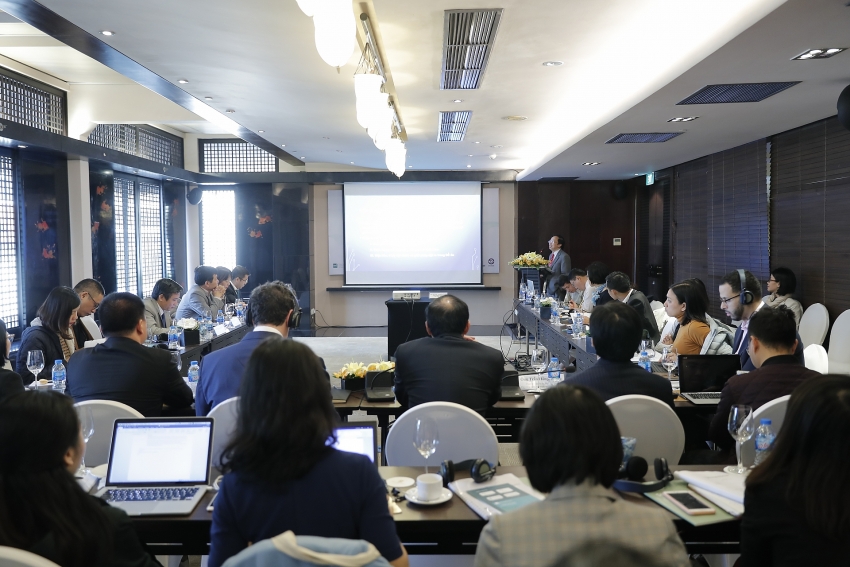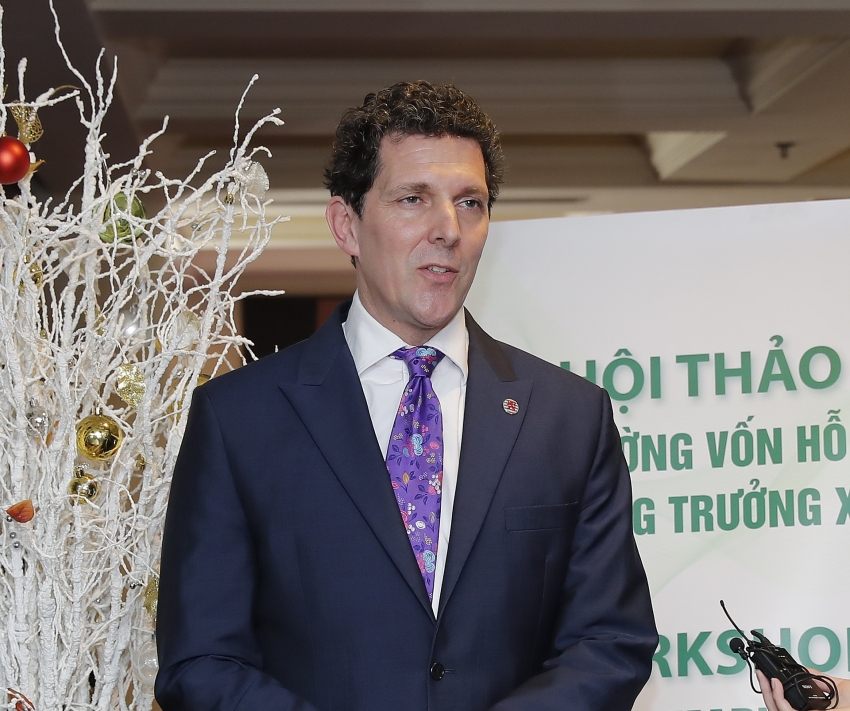Securing the necessary funding for green growth
 |
| The Workshop on Capital Market for Green Growth |
At the Workshop on Capital Market for Green Growth yesterday (December 19), the Vietnam Green Growth Strategy fully embraced objectives like “traditional lifestyle” and “living in harmony with nature” in its green economy paradigm.
The World Bank and other multilateral development banks have been warning that since August 2015, the implementation of the Sustainable Development Goals (SDGs) will require reinforcing funding and financing efforts from billions to trillions of dollars and that only combined funding and financing from the public and the private sector side can make the goals possible, with the private sector taking the lead.
According to Marc de Bourcy, chargé d'affaires of the Luxembourg Embassy, Vietnam’s leadership is well aware that the implementation of the 17 SDGs and 115 specific targets depends in a large part on resource mobilisation and the effective and credible participation of the private sector, more specifically through Vietnam’s growing capital markets and key finance and banking players. These actors and players will be crucial in attracting important international investments and investors to finance clean energy projects, energy efficiency, public transport, and water in Vietnam.
Nguyen Tuan Anh, deputy director general of the Ministry of Planning and Investment’s Department of Science, Education, and Natural Environment, said that Vietnam needs about $30 million in funding by 2020, primarily in the energy sector, while the state budget is able to shoulder about $10 billion (to which Development Partners contribute about 30 per cent via ODA and climate finance), hence there is a funding gap of about $20 billion in green growth projects in Vietnam until 2020.
The Ministry of Finance has been proactively developing the framework for green capital market and green finance products in order to mobilise key private investment capital into Vietnam’s National Action Plan for Green Growth. In this context, the vision of the State Securities Commission (SSC) to devise a 2030 roadmap for the development of Vietnam’s stock market is commended as a step towards more and greener capital markets and sustainable financial products.
However, finance and financing is not the end goal, they are merely a means to an end, an essential ingredient towards the achievement of the SDGs and the fight against climate change.
 |
| Marc de Bourcy, chargé d'affaires of Luxembourg Embassy |
Talking about green financing in Luxembourg, Marc de Bourcy said that as one of the EU’s three largest financial centres, Luxembourg is home to over 140 international banks. It is also the largest investment fund center in the EU (with €4.23 trillion – $4.8 trillion in June 2018), and the second in the world with over 61,000 cross-border fund registrations from70 markets worldwide.
In Luxembourg, investment funds remain a privileged set of tools for climate financing and green growth, through structured funds with institutional and private sector co-investors like the world’s first green bond European Investment Bank (EIB) and the International Finance Corporation (IFC).
According to the Bourcy, in the last 10 years, Luxembourg provided an ideal environment for climate finance funds as well as several concrete actions and initiatives. For example, climate financing has been on the radar of the Luxembourg Stock Exchange, and was boosted in unheard of proportions with the 2016 launch of the Luxembourg Green Exchange (LGX), the first and only stock exchange in the world to list exclusively green, social, and sustainable bonds, based on ICMA Green Bond Principles.
The Luxembourgian government contribute financially to other public-private initiatives as a first-loss guarantee to mitigate private sector investment risk, with the EIB acting as a co-investor. Luxembourg recently launched the Forestry and Climate Change Fund (FCCF) to support secondary forests in Central America.
Another PPP initiative is the agri-business capital fund, a blended capital impact fund from smallholder farmers, with IFAD, AGRA, the EU and Luxembourg government, and two international fund managers. Additionally, Luxembourg’s government and private sector partners have set up the International Climate Finance Accelerator, supporting innovation and high-impact investment strategies to grow climate finance leaders.
Sustainability has become a systemic imperative and an opportunity for the Luxembourgian government and its finance industry.
To be sustainable, a financial center has everything to gain from keeping an open mind in proactively exploring new and innovative business opportunities.
From the operational perspective, a sustainable financial center will help reassess the type of funding and financing for sustainable projects, programmes, and policies required. Any type of funding and financing aiming for lasting financial return coupled with social and environmental impact should be made available on a steady and reliable basis for a prolonged period and should be able to provide the right financing at the right moment.
What the stars mean:
★ Poor ★ ★ Promising ★★★ Good ★★★★ Very good ★★★★★ Exceptional
Related Contents
Latest News
More News
- NAB Innovation Centre underscores Vietnam’s appeal for tech investment (January 30, 2026 | 11:16)
- Vietnam moves towards market-based fuel management with E10 rollout (January 30, 2026 | 11:10)
- Vietnam startup funding enters a period of capital reset (January 30, 2026 | 11:06)
- Vietnam strengthens public debt management with World Bank and IMF (January 30, 2026 | 11:00)
- PM inspects APEC 2027 project progress in An Giang province (January 29, 2026 | 09:00)
- Vietnam among the world’s top 15 trading nations (January 28, 2026 | 17:12)
- Vietnam accelerates preparations for arbitration centre linked to new financial hub (January 28, 2026 | 17:09)
- Vietnam's IPO market on recovery trajectory (January 28, 2026 | 17:04)
- Digital economy takes centre stage in Vietnam’s new growth model (January 28, 2026 | 11:43)
- EU Council president to visit Vietnam amid partnership upgrade (January 28, 2026 | 11:00)

 Tag:
Tag:

























 Mobile Version
Mobile Version